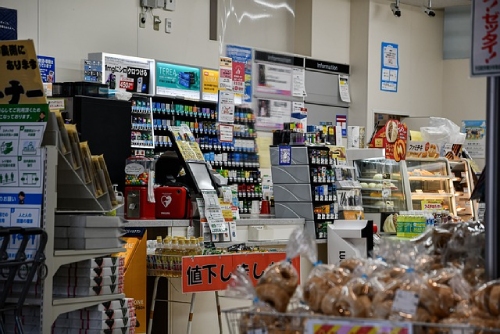So, you’re going to Japan to study abroad. You must be excited, nervous, and maybe even a little bit concerned.
Especially if it is your first time in Japan, you may be wondering what you can expect from living in the country long-term.
In this article, we will be breaking down some of the most surprising aspects of life in Japan as a student.
These were all considered and chosen by those who have had experience studying abroad in Tokyo.
Let’s get started!
This article was updated on February 26, 2024.
Table of Contents
- Japan has more than 4 million vending machines offering anything
- You will probably have trouble getting a cellphone
- Expect to make friends through school clubs
- The alcohol culture is strong
- You won’t be using the words you learned in class as much as you think
- Everything is smaller
- English is not widely spoken
- Over 70% of Japanese are still using cash??
- Fruits and vegetables are expensive
- Getting your own apartment can be confusing
1. Japan has more than 4 million vending machines offering practically anything

Left: Sriracha vending machine / Right: Xiao long bao vending machine
As a country, Japan has roughly 5 million vending machines.
That is the highest density of vending machines in the world. This might be related to the high level of public safety.
One common situation is that many office workers are so busy they do not even have time to go to a convenience store to pick up lunch or sometimes dinner.
Vending machines allow them to eliminate the need to go to a store or wait to buy their meal.
Of course, you can buy a variety of drinks, including coffee, tea, juice, and water. However, not only are cold drinks offered, but hot drinks can also be purchased in the same machine.
Warm corn soup is a popular drink, along with red bean soup, that you can buy from many vending machines in the cold winters. Perfect to warm you up!
Drinks are not the only things you can purchase at vending machines. Recently, many unique vending machines have popped up in Japan. You can buy Ramen, Udon, Karaage, Takoyaki, dumplings, eggs, soy sauce, cake, and more. You can even purchase insects to eat at some vending machines!
For an exciting one-of-a-kind experience, visit these unique vending machines with your friends when you come to Japan! We’re sure you will be shocked by what you can find!
(Hint: You can search online for locations of vending machines that interest you. Or you can enjoy coming across them during your time in Japan!)
↑ Go back to the table of contents
2. You will probably have trouble getting a cellphone

In this day and age, there is a high possibility that you cannot survive without your smartphone.
If this is the case, you will need to be looking to get a cellphone contract in Japan ASAP.
There are three major cellular networks in Japan: docomo, au, and SoftBank. These are seemingly the best choice, being the biggest and most trusted networks in the country.
However, the application is quite long and complicated, and in most cases must be done entirely in Japanese. Additionally, before you even begin to apply, you must have a residence card with your address printed on the back.
This process is even more grueling if you are a minor, as you will need to get parental consent forms that potentially need to be physically signed and sent back and forth.
If you are looking to get an affordable Japanese cellphone plan quickly and entirely in English, we recommend Sakura Mobile.
Features of Sakura Mobile
- Get large amounts of data (maximum 25 GB/month) for only 4,378 JPY/month
- Connection with docomo, the biggest and fastest network in Japan
- Full English Support 7 days a week. The homepage and the “My Page” (where you can check your remaining data, change your plan, terminate your contract, etc.) for users are all in English
- Complete your order online and have it delivered the next day at the earliest
- For those who are not yet in Japan, you can arrange to pick up your SIM card from the airport
Sakura Mobile has helped thousands of new residents and travelers in Japan stay connected during their stay in Japan.
You can find more information about Sakura Mobile’s plans here.
As we mentioned, docomo is one of the major carriers in Japan. If you’re considering docomo, check out our blog on docomo phone plans for more information.
Wondering which mobile carrier has the best coverage in Japan?📱
Read our in-depth guide comparing NTT docomo, Softbank, and au here
↑ Go back to the table of contents
3. Expect to make friends through school clubs

As with schools in any country, extracurriculars are a large part of Japanese campus life.
Clubs (called “circles”) in Japan are extensive and centered around every niche that you could possibly think of, from the traditional Japanese tea ceremony to the appreciation of potatoes (yes, this is real).
These circles will hold retreats where all its members go on a trip together where you practice (if you are part of a sports or a performing art circle) and bond. Depending on the circle, you may have no retreats or multiple retreats per year.
Parties and more casual get-togethers are also widely organized within circles.
Because Japanese university class sizes generally tend to be very large, it is hard to make friends strictly through class. You will find that most people meet their closest friends through circles.
If you are still a beginner with the Japanese language, we recommend that you join a cultural exchange circle. They will usually have many Japanese students who are interested in different languages and cultures and who will match your language level.
Keep in mind that the “new recruits” season happens in early April for most schools, making it the prime time to join.
↑ Go back to the table of contents
4. The alcohol culture is strong

In Japan, drinking on the streets is legal, and the people definitely like to take advantage of the law.
Cheap alcohol can be bought at the press of a button in convenience stores, and there is always an abundance of nightlife in and around the city.
Many restaurants in Japan offer “All you can drink” for alcohol. It starts from about $20 for 2 hours.
If you’re thinking about spending time in the most populated areas, it will become a common occurrence to see drunkards passed out on the street (with their phone and wallet intact, of course, because Japan is just that safe).
Furthermore, drinking is the default pastime when going out with friends and coworkers. In many peoples’ minds, spending time together will usually include some sort of drinking time as well.
Even if you do not or cannot drink alcohol, there is a lot to explore in terms of nightlife in Tokyo so it might be a good idea to try it out at least once!
↑ Go back to the table of contents
5. You won’t be using the words you used in class as much as you think

You may have spent years studying Japanese using textbooks and listening practice CDs, and now you feel ready to take your shot at living in the country.
While any sort of preparation you can get with the language is going to be an asset, you may be surprised at just how little textbook Japanese will make an appearance in your daily life.
At first, you may have trouble ordering at restaurants or buying things at the convenience store when the employee suddenly asks you a question you’ve never heard before.
Colloquial Japanese in particular is always shifting and changing and you might find yourself wondering, “Where did that particle go?” or “That’s not what I learned in class.”
The best way to learn about the most widely used vocab or how to use Japanese in the most natural-sounding way is to just get out and explore.
↑ Go back to the table of contents
6. Everything is smaller

Especially in big cities like Tokyo, everything is optimized to be as compact and functional as possible.
What first comes to mind are the apartments, which can range from 25 to 40 square meters if you are living on your own. Many older and smaller apartments even have the toilet and the shower mere inches away from each other to save space.
However, there are other things in Japan that you will find perhaps come much more fun-sized than in your home country.
You will find that the small sizes at restaurants are… well, very small. In many cases, smaller than you will be suspecting.
Coming to Japan means that your days of getting large portions and then taking some home the next day to eat as leftovers are gone.
Getting used to the portion sizes also means getting used to an extremely balanced diet as well, as Japanese foods are made with health in mind.
↑ Go back to the table of contents
7. English is not widely spoken

It might come as a surprise to you that not many people speak English well in Japan.
Although English is part of compulsory education, there are very few opportunities to actually use the language while living in Japan, so many people can read or write much better than they can speak.
However, you will find that people are generally very kind and will try their best to help you if you need it.
If you do not know any Japanese, it would be wise to remember a few simple phrases to ask for things that you need help with.
↑ Go back to the table of contents
8. Over 70% of Japanese are still using cash??

Cash, right? Who carries that around anymore? Well, according to recent statistics, over 70% of Japanese are still using cash in their daily life.
A possibility for this may be related to the Japanese economy’s strong reliability toward cash in Japan.
One reason is that Japan is a safe country, and the risk of theft is low. Therefore, people feel safe carrying money with them. Another reason is that Japan’s currency counterfeit countermeasures technology (creating banknotes and coins) is quite advanced, and the risk of counterfeit bills is lower than in other countries.
The Japanese government is trying to promote and move towards a cashless society, but while many restaurants and stores are now accepting cashless payments, you may still face situations in which you need cash in daily life. Some restaurants, hospitals, and pharmacies especially still accept only cash.
To make sure you do not find yourself in an awkward situation, it is recommended to carry cash with you at all times.
↑ Go back to the table of contents
9. Fruits and vegetables are expensive

Japan has very high-quality ingredients in the supermarkets, and the seasonal fruits and vegetables are a great addition to any meal.
However, fresh produce especially fruits can be pricy. There are even shops that specialize in “designer fruit,” that sell for unbelievably high prices.
Because eating out is generally cheap in Japan, it might be surprising that the prices for fruits and vegetables are so high.
There are budget supermarkets that have more affordable options for produce, so we recommend that you stake out your cheapest local grocery store if you are on a budget.
↑ Go back to the table of contents
10. Getting your own apartment can be confusing

Apartments in Japan can be confusing; for example, the sizes of apartments can be broken up into a series of numbers and letters (2LDK = 2 bedrooms, living room, dining room, kitchen).
Additionally, there are other factors besides size or location that you might want to pay attention to in order to make sure you get to live in an apartment that suites your needs (whether your room faces the south for sunlight, whether you can have instruments or not, among other things).
There are endless options for real estate agencies in Japan, but almost all of them operate entirely in Japanese and you will need to sign contracts in Japanese as well.
Many apartments will require you to have a guarantor, so unless you have family in Japan, you will either need to pay a separate company to become your guarantor or ask a trusted Japanese friend. Keep in mind that some apartment complexes will not allow international residents to live in the building.
Some housing agencies offer services in English. Although there are rumors that these places charge more, you can rest easy going through the process in English and knowing exactly what is written in your housing contract.
↑ Go back to the table of contents
EXTRA: Convenience stores are on another level

Especially in big cities like Tokyo, everything is optimized to be as compact and functional as possible. (Just take a look at the apartments in Tokyo!)
Japanese convenience stores are no exception. Famous for their abundant and high-quality products, these are not the only things that make Japanese convenience stores so great!
Did you know that convenience stores offer a variety of convenient services? (How fitting a name!)
For example, you can purchase advance tickets for movies, concerts, sports games, ski lift tickets, Disneyland, express buses, etc.
You can also send packages at each convenience store 24 hours a day, which is particularly useful when you cannot make it to the post office or delivery company’s office during their business hours.
Need to print out or make a copy of your homework? Multi-copiers are very useful for those who do not have a printer at home. In addition to the copy function, you can print photos by sending images from your Wi-Fi-capable smartphone or using a USB, and SD cards are also supported. Great for printing out those great moments with your friends and want to share the memories!
Furthermore, if you have a My Number card, you can easily access official documents, such as a resident card, without going to the municipal office. This saves you time and money, especially since the municipal or city office hours are quite short and only during the weekdays.
Conclusion
What did you think?
Were you surprised by anything on our list? If you have been living in Japan, you might have resonated with quite a few of these.
Whether or not you experience culture shock, you are sure to have a great time in Japan with all the amazing sights and things to do.
Good luck with your study abroad!
↑ Go back to the table of contents
Those looking for an affordable Japanese cellphone plan, check out Sakura Mobile!
CUSTOMER’S VOICE
Features of Sakura Mobile
- Get large amounts of data (maximum 25 GB/month) for only 4,378 JPY/month
- Connection with docomo, the biggest and fastest network in Japan
- Full English Support 7 days a week. The homepage and the “My Page” (where you can check your remaining data, change your plan, terminate your contract, etc.) for users are all in English
- Complete your order online and have it delivered the next day at the earliest
- For those who are not yet in Japan, you can arrange to pick up your SIM card from the airport
Sakura Mobile has helped thousands of new residents and travelers in Japan stay connected during their stay in Japan.
You can find more information about Sakura Mobile’s plans here.


